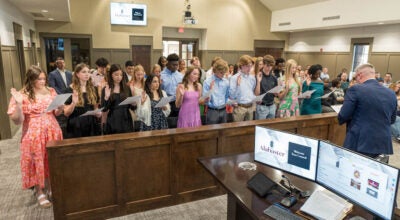Profile: Montevallo’s relationship with Japanese pottery village steadily growing
Published 3:30 pm Monday, March 10, 2014
By STEPHANIE BRUMFIELD
Photos by JON GOERING and CONTRIBUTED
Montevallo and the city of Echizen, Japan, have a lot in common. Geographically, both have warm, humid climates, and their latitudes are degrees apart. Culturally, family is the backbone, and hospitality seems like second nature. But these affinities are mere coincidences. The communities’ shared love of pottery, however, is not.
Montevallo and Echizen officially became sister cities in 2008, though their collective history dates back to 1995, when the Birmingham Museum of Art hosted one of the first international exhibitions of Echizen pottery. University of Montevallo art professor Ted Metz received a phone call from the museum’s curator asking if he would be willing to host a workshop led by Echizen potters. Metz reluctantly said yes.
“It always strikes me how it can be such an innocent little thing that can start something big,” Metz said. “I didn’t even know about the exhibition. I didn’t care about the exhibition, and I reluctantly accepted the invitation because I knew it was going to be a lot of work.”
But even though Metz admits he kind of “backed into it,” he’s glad he did, for that one, reluctant “yes” has since “blossomed in time into something huge.” Since 2009, Echizen and Montevallo have formally exchanged groups of about a dozen travelers every year, although several informal exchanges occurred years before the sister city agreement was ever discussed.
For instance, in 1996, two University of Montevallo students were invited to study pottery in Japan for an entire year with Jeromon Fujita, a Japanese Living National Treasure and eighth generation potter who met the students at the workshop in 1995. Fujita had been asked by Japan’s emperor to share his techniques with other cultures, and he was particularly impressed with Chris Kelly and Tracy Shell, who were graduate students at the time.
Both Kelly and Shell went a year later in 1997, and unbeknownst to Metz, the impromptu exchange would be the first of more than a dozen that would occur over the next two decades. It was also an invitation that Metz said is “almost unheard of,” and one that affected the students tremendously.
“In Japan, you’d make tea for seven years or sweep the studio floor before you get to actually work with the big gun,” Metz said. “So for two American students to be invited to Japan and study for a year was quite amazing.”
About Kelly, Metz said he was “just a regular art student taking ceramics” before going to Japan.
“(Kelly) was a good student, but he didn’t know where he was going to end up,” Metz said. “He had that experience working in Japan, and he came back a serious potter and ceramics sculptor … and now he’s the chairman of the art department at Piedmont College in Georgia, which has a strong ceramics department, and he takes his students every year to Japan.”
Shell now teaches ceramics at Midland College in Texas.
Kelly said the experience gave him “an advantage and has helped me as I’ve moved forward in my career” while also giving him the unique gift of being able to carry on the Fujita family tradition.
“The Fujita family is known for making a certain type of pot,” Kelly said. “It’s something he taught me. They kind of gave me the gift of their family’s tradition.”
Since then, both Fujita and his son have died, though not before they helped Kelly build a version of the family’s kiln at Piedmont College.
“(His son) was the last in the line, so the gift they gave me is kind of an interesting burden,” Kelly said. “That’s another reason I like that I can take my students back there every year.”
Currently, Kelly said he has taken more than 100 students to Japan, and he isn’t the only one who recognizes the significance of those annual trips.
“(Kelly) got to go to Japan for a year, but that experience influenced his whole career and his life, and now he’s taking 30 students a year over there, and that’s going to influence those people,” Metz said. “Just saying yes to (the workshop) opened up a world of possibilities for lots and lots of other people, and it’s really cool. I feel really good about it.”
Forming partnerships
In preparation for Kelly and Shell going to Japan, Metz visited Echizen for the first time in 1997 and began forming relationships with Echizen city officials. While in Japan, Metz met Naomi Hashimoto, an Echizen city employee responsible for managing international affairs and promoting Echizen pottery. The exchanges began soon after.
In 2001, a group of eight Japanese drummers came to the United States and performed at Desoto Caverns and the Birmingham Museum of Art, paying their own way and staying on the UM campus during their visit.
In 2002, a jazz and rock band composed of Montevallo high school students went to Echizen and performed at local schools, a trip that was paid for by the Echizen local government.
In 2003, a group of imperial dancers performed at UM, again traveling at their own expense.
In 2004, artistic exchanges were expanded to include middle school students. Five Montevallo Middle School students traveled to Japan while students from Miyazaki, Japan, traveled to Montevallo, both groups staying in the homes of their traveling counterparts.
“On the Japanese part, it became part of their city vision,” Metz said. “We were kind of a line item on their budget.”
On the Montevallo side, Metz said the exchanges were possible only because of what he could scrape together, and because of UM’s “generosity to house people” and provide meal tickets.
As the years went by, Metz said it became obvious that the partnership “could really take off” and become something more if it could gain community backing. He also realized the project was becoming more than he could handle, so he asked for help.
Help came in the form of then Montevallo city council member – and now mayor – Hollie Cost, while community backing came in the form of the Montevallo Sister City Commission, a non-profit formed in 2007 with 11 board members. Cost served as the commission’s first president.
That same year, Metz traveled to Japan to present a sister city proposal to Echizen’s mayor. Discussions about becoming sister cities continued into the next year, and the official agreement was signed in October of 2008.
“It’s a designation,” Metz said. “It means your communities are committed to each other, but there are no rules involved. Sister cities can either be real intense or energetic, or they can just be in name only. Ours is pretty energetic.”
Educational travel
The sister city partnership was formed to foster four types of exchanges between the two communities – cultural, educational, economic or industrial and athletic. In the beginning, the relationship evolved primarily through the arts and cultural exchanges, although more recently, education has been the focus.
Since the first group of Montevallo students visited Echizen in July 2009, the cities have agreed to host students every other year on a rotating basis, with Montevallo hosting Echizen students during even years and Echizen hosting Montevallo students during odd years. Exchanges involving groups of about 10-12 students ages 12-16 have occurred every year since then except 2011, when the trip was cancelled because of the tsunami and earthquake, which both occurred in March of that year, though Echizen was not affected by either disaster.
“We felt like us going over there would have been an undue burden on them,” Cost said.
For the exchanges, students are selected based on applications, recommendations and interviews, and once selected, they attend a series of monthly meetings to learn about Japanese culture before going on the trip. They learn by doing research at home and then giving presentations on topics like clothing, music, food, religions, geography and history. About a month before the trip, weekly meetings begin to help the students know what kind of luggage to take and what to pack.
“Some of these kids had never even flown on a plane,” said Cost, who served as a chaperone for the 2013 trip to Japan. “Some had never left the state, and so this was a huge, I would say life-altering experience for many of the children that went.”
When students go on the trips, they are responsible for paying for their plane tickets only. The host city, in this case Echizen, pays for everything else.
“The same (is true) when they come over here,” Cost said. “They only pay for the plane ticket, we pick them up at the airport and we pay for everything for them until they get back on the plane.”
The city of Montevallo contributes between $1,000 and $2,000 every year to fund the exchanges, with the Sister City Commission covering the cost of field trips and host families absorbing the cost of food and transportation for the travelers, Cost said. In the past, field trips have included trips to the McWane Center, Chattanooga, American Village, Cost’s lake house in Clanton and churches where the host families are members.
“The whole point is for them to really get immersed in American culture,” Cost said. “Sometimes people think, ‘Oh, why do they want to visit Montevallo?’ Well, it’s not just to visit Montevallo. It’s to get immersed in the American culture and to see what families do here.”
The same is true for when Montevallo students visit Japan, though in Japan the cultural immersion is more instructional, Cost said.
“They really focus on teaching you the culture there,” she said. “They taught us how to cook certain things. They took us to an old textile factory, and then we got to make something on a textile loom. They taught us how to make paper. A Buddhist monk taught us how to meditate. They taught us calligraphy. (They provided) all of these real educational experiences that were so enriching to the children and to the chaperones that went over there.”
Metz, who often drives the students around when they visit, said the benefit of both sets of students traveling is untold and immeasurable.
“When you take a 12-year-old and you send them to another country, you don’t know how that’s going to shake down, but it has to influence them in some way,” Metz said. “Traveling is a really good way to get a better perspective on the world and appreciate other kinds of cultures, to realize that there are other ways to do things and other ways to think and other religious beliefs and other ways to practice religion and other ways to honor your parents and grandparents and other ways to bury people. It’s pretty different.
“But I know it also influences the Japanese when they come over here. We’ve had several Japanese teachers who teach English to Japanese children who had never been to the United States, and who had never been to an English speaking country. They come here, and they get to practice their English. They get to get a sense of how it’s spoken and how it’s handled, and I know that’s had an impact on how they go back and teach English to their children,” he said.
Next steps
The Sister City Commission is currently looking at ways to expand the third level of the partnership, or economic and industrial exchanges.
“They’ve asked us if we can help them market their work,” Metz said. “They have this great tradition of ceramics in their community, and they sell it well in Japan, but they have no international market.”
So far, the Sister City Commission has held meetings with professionals in business, international shipping, storage and industrial development.
“We’re starting out small, and it may just blossom into something bigger down the road,” Metz said. “We’re going to let it find its path, and we have to find the right people who are interested in it.”
Because of the quality of the ceramics, Metz said “it would be nice if the only place where you can get Echizen pottery in the United States is Montevallo,” or if a shipping center could be in Montevallo. He also said the possibility of international markets isn’t a one-way deal.
“Conversely, there would be an opportunity for some of our products to go over there,” he said. “We could make in-roads into their community if we chose to.”
Regarding the last level of partnership, athletics, Metz said it hasn’t even been thought about, though he expects the partnership to continue to grow and evolve.
“Some of my best experiences (in Japan) have been my interaction with people, just total strangers,” Metz said. “The Japanese will just go out of their way to take care of any visitors to their country … I remember in Kyoto trying to find a certain temple, and I just asked someone and they walked us to it. It was four blocks away, and they made sure we got there. That kind of thing is not unique. They really go out of their way to accommodate a visitor.”










